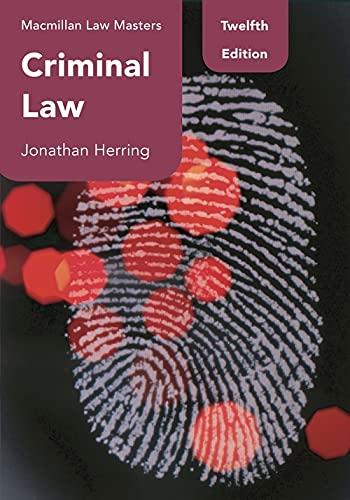Question
Trial witnesses traditionally are limited to giving answers that contain only facts and are not theoretically supposed to render opinions because the function of the
Trial witnesses traditionally are limited to giving answers that contain only facts and are not theoretically supposed to render opinions because the function of the jury is to evaluate the evidence and develop opinions and conclusions regarding the factual matters at issue. Practical necessity has dictated that exceptions to this rule must be recognized. The purpose of Chapter 11 is to state, define, and give reasons for the rule, and to enumerate the many exceptions to the rule, excluding opinions and the requirements to the exceptions. The law of evidence treats expert witnesses different than lay witnesses because expert witnesses are expected to offer opinions covering their respective areas of expertise. The materials in this chapter will differentiate the two witnesses and detail the specific rules relating to the admission of opinion evidence and testimony.
Almost everyone has heard the term hearsay, but the precise legal definition often seems to be misunderstood. Hearsay evidence consists of an out of court statement that is offered in court to prove the truth of what it asserts. The objectives of Chapter 12 include defining and explaining the hearsay rule, as well as tracing some of the history of the rule and its exceptions. This chapter emphasizes the practical application of the hearsay rule in developing and presenting testimony in criminal trials. The first principle of the hearsay rule is: Hearsay is not admissible into evidence. Fed. R. Evid. 802. In short, "hearsay" is a statement made by a declarant,not while testifying at a current trial or hearing, offered by a party to prove the truth of the matter asserted in the statement. Fed. R. Evid. 801(c). The shorthand recitation of this definition, which any law student can recite, is: Hearsay is "an out-of-court statement offered for the truth of the matter asserted." Anderson v. United States, 417 U.S. 211 (1974) ("Out-of-court statements constitute hearsay only when offered in evidence to prove the truth of the matter asserted.").
The fundamental policy underlying the exclusion of hearsay is that the declarant (who made the statement at issue) is not subject to cross-examination. When Person A testifies that Person B "told me XYZ," Person B is not present for cross-examination. The idea is that cross-examination is a powerful tool to expose weaknesses in testimony. All things being equal, it is better to subject a declarant to the rigors of cross-examination to test the strength of the declarant's testimony. Hence, hearsay generally is excluded from evidence (which forces declarants to testify in court, under oath, and subject to cross-examination). That said, the rules of evidence nevertheless deem certain out-of-court statements admissible (or, at least, not inadmissible). This is where hearsay's multitudinous "exemptions" and "exceptions" enter the picture. How can one keep all of this organized in one's mind? The two hearsay "exemptions" are easy enough to remember. They both relate to prior statements: either (1) prior statements of a declarant-witness testifying on the stand or (2) prior statements of an opposing party. Fed. R. Evid. 801(d)(1), (2). Exemption (1) allows for the classic cross-examination of a witness. Trial counsel may use a witness's prior inconsistent statements to impeach the witness. Exemption (2) simply is a natural part of our adversary system. Fed. R. Evid. 801(d)(2) advisory comm. note (1972) ("Admissions by a party-opponent are excluded from . . . hearsay on the theory that their admissibility in evidence is the result of the adversary system. This is where it is helpful to think of the word "truth" in the phrase "truth of the matter asserted" to mean subjective sincerity and honesty (as opposed to objective factual accuracy). This is because the twenty-three exceptions listed in Rule 803 of the Federal Rules of Evidence, which pay no heed to a declarant's unavailability, generally relate to statements made under circumstances that increase the likelihood of their subjective sincerity and honesty.
Excited utterances are exceptions to the hearsay rule.
Issue: The rationale for allowing excited utterances into evidence is that such utterances, "while made in the midst of a startling event" would be reliable because there is no time to fabricate a false response to the event.
Q1. Do you agree with this rationale? Support your position.
Excited Utterances and the Hearsay Rule
https://www.youtube.com/watch?v=I1xTQM12UWk
Step by Step Solution
There are 3 Steps involved in it
Step: 1

Get Instant Access to Expert-Tailored Solutions
See step-by-step solutions with expert insights and AI powered tools for academic success
Step: 2

Step: 3

Ace Your Homework with AI
Get the answers you need in no time with our AI-driven, step-by-step assistance
Get Started


